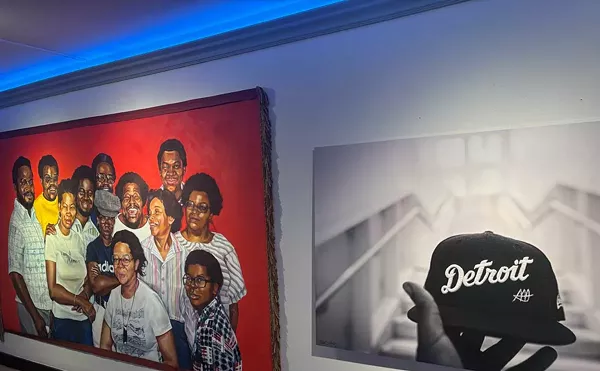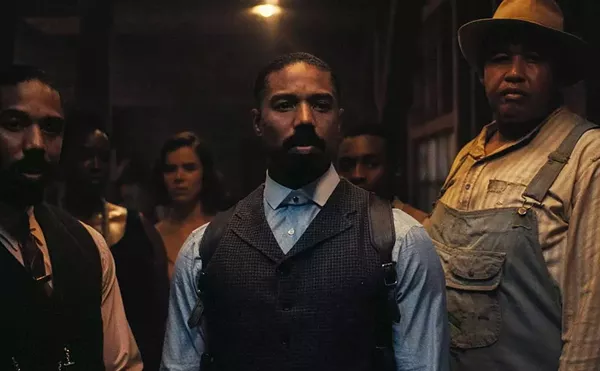
Audio By Carbonatix
[
{
"name": "GPT - Leaderboard - Inline - Content",
"component": "35519556",
"insertPoint": "5th",
"startingPoint": "3",
"requiredCountToDisplay": "3",
"maxInsertions": 100,
"adList": [
{
"adPreset": "LeaderboardInline"
}
]
}
]
Poised between the last days of film noir and the beginning of the French New Wave, Jean-Pierre Melville’s 1955 cult item, Bob le Flambeur (translation: “Bob the Gambler” or, more idiomatically, “Bob the High Roller”) manages to seem both prescient and nostalgic. Its wintry, black-and-white exteriors and sensual interiors, the semidocumentary feel of its wandering street scenes and its studied casualness all anticipate early Chabrol and Truffaut (both of whom would use Melville’s cinematographer, Henri Decaë) and to a lesser extent Godard. It has that modern element of cool regard that seems, for now, timeless.
As for its retro influences, it looks back more to the ’30s than the ’40s, more to gangster films than the psychologically troubled shadowland of post-World War II noir. In fact, its characters all seem pre-psychological types who live their lives on the surface — even the Dostoevskyian implications of Bob’s obsession with chance are left unexploited. This is the kind of film where the body count can be rather high but the overall mood remain one of easy, if occasionally dark, insouciance.
Bob, real name Robert Montagné (Roger Duchesne), is a silver-haired, trench-coated, semireformed, 49-year-old ex-con who’s given up bank robbery for professional gambling. Everybody knows Bob; the young punks want to be Bob and he tools his way around the dives and dens of Pigalle with the low-keyed charisma of one of life’s natural aristocrats. Bob’s days of struggling for the big score are behind him and he now pursues the lucky break with the focused but unfazed intensity of someone who knows that no matter how much he loses, things could always be worse. Bob may be a dubious character, but he does have standards: He won’t loan money to pimps; he has a fatherly concern for his protégé, Paulo (Daniel Cauchy), and he won’t take advantage of the young beauty, Anne (Isabel Corey), who has chosen him to be her protector.
The first two-thirds of the film unfold at a leisurely pace as we become acquainted with Bob, Paulo, Anne and the scuzzy police informant, Marc (Gerard Buhr), who we know is going to be trouble. Melville evinces a lyrical take on the Montmartre milieu, though at times he can seem like a tourist from Squaresville, utilizing a murky and mediocre jazz score with the occasional black musician as a signifier of low-life exotica.
Duchesne, though effectively iconic, is nearly overshadowed by the beguiling Corey who was only 16 when the film was shot. And though she certainly looks older than her age, her youth may account for her somewhat blurry voluptuousness, the sense she gives of being a little girl playing at being a seductress, both vulnerable and not giving a damn. At the same time, she seems prematurely aged; looking fresh but not quite innocent, her flirtation with the much older Bob has no Lolita charge to it (which will be a relief for some, a disappointment for others).
Eventually the film settles into a heist plot as Bob is lured by one last caper, the robbing of a casino safe. Inevitably, comparisons to The Asphalt Jungle (1950), one of the handful of perfect films in John Huston’s checkered oeuvre, arise — and Melville has the wit and wisdom to do a variant rather than a copy. In his version, the deck is so stacked against Bob and his crew that you’re hoping that something will intervene and disrupt their plans. You start hoping, like Bob, for that lucky break.
Bob le Flambeur isn’t one of the great films, but it is a pretty good one. It’s very different than Melville’s later crime dramas such as Le Samourai (1967) and Le Cercle Rouge (1972), where ritual takes precedence over context to the point of near-abstraction. Bob, with its input from writer Auguste Le Breton (author of Rififi, the basis of the famous Jules Dassin film), is less stringent and more pulpishly entertaining, despite its slow-moving exposition. And its last 20 minutes or so are tense enough that one forgives any previous flabbiness.
Bob gets his lucky break, but it’s not what you’d expect. And in the face of an ambiguous fate, he gets the last word, a cool guy to the bittersweet end.
Showing exclusively at the Detroit Film Theatre (inside the DIA, 5200 Woodward Ave., Detroit), Friday through Sunday. Call 313-833-3237.
Richard C. Walls writes about the arts for Metro Times. E-mail him at letters@metrotimes.com.





